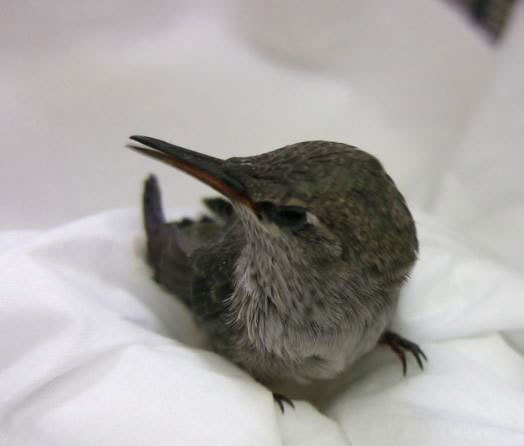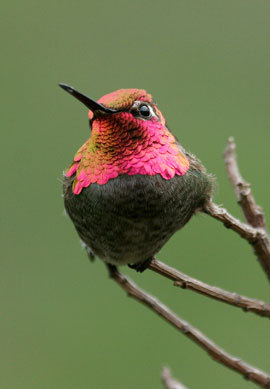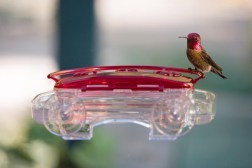WildCare's Wildlife Hospital treats nearly 4,000 ill, injured and orphaned wild animal patients from over 200 species every year. This is one patient's story.
When you walk out the door of your home, you don't expect to find an orphaned hummingbird on the walking path.
That's the thing about rescuing a wild animal -- it so often happens when you least expect it, and when it's least convenient
But a small green bird fluttering and flopping on the ground obviously needs help.
In the case of WildCare patient #3207, an Anna's Hummingbird, the rescuer called WildCare and spoke with a Hotline Operator. She was told the bird needed to come to the Wildlife Hospital as soon as possible.
It is especially critical to get hummingbird patients immediate care because a hummingbird's metabolism is so fast he can quickly burn through the calories his body needs to survive.
In the Wildlife Hospital, we admit adult and juvenile hummingbirds that were struck by cars, hit windows, got caught by cats or were stuck inside houses and other structures.
In addition, we often get baby hummingbirds who are victims of tree trimming -- at WildCare we ask everyone to be particularly careful when trimming back bushes and trees in the spring and summer months, as you may be surprised to find a hummingbird nest tucked carefully away in your garden.
If a hummingbird is caught inside, you can often lure it outside with a pot of brightly colored flowers. As with all birds, turning off lights, closing blinds and making the room as dark as possible to contrast with the open door will encourage the bird to fly out. Even better than potted flowers, if you have a hummingbird feeder, hanging it just outside the door will draw the bird out even faster.
However, hummingbird feeders come with an element of responsibility -- they must be kept clean. Feeders offer additional energy to these birds when natural food supplies are low. You can fill a feeder with a solution of 1 part sugar to 4 parts water without food coloring (the coloring is unnecessary, and the birds will find and use the feeder without it), but only fill the feeder with enough solution to last 1-2 days to prevent mold.
If you choose to feed hummingbirds, your feeder should be taken down and cleaned every couple of days to make sure it is not passing on bacteria and illness to other birds. Use vinegar and water (not bleach!) in a 9:1 solution (9 parts water to 1 part vinegar) and special bottle brushes to get into small holes. Rinse thoroughly! If you keep your feeder clean, you will be assisting in keeping your neighborhood hummingbirds healthy.
If you find an injured or orphaned hummingbird, it is more likely to survive if you bring it to a wildlife hospital immediately (click for a list of rehabbers nationwide). Pick the bird up very carefully and put it on a soft cloth in a box and keep it warm and dark. If the bird is sitting on something, do not attempt to remove it. Hummingbirds have very delicate toes, and trying to remove the bird from whatever it's sitting on can easily break toes.
Do not feed the bird. A cold, sick or injured bird may not be able to swallow the food and can aspirate (choke). Sugar water on a hummingbird's feathers can impact the bird's ability to thermoregulate (control body temperature), his water-proofing and even his ability to fly.
Hummingbird patient #3207 was extremely lucky to be found and brought to WildCare. At last check he was doing fine. He started eating on his own, and he's perching and starting to fly around a bit.
This is excellent news for this little bird and everyone involved in his rescue. Hopefully other injured hummingbirds found this season will have the same happy result.
WildCare is a 501(c)3 nonprofit organization supported almost entirely by private donations and individual memberships. Visit us online at wildcarebayarea.org.



